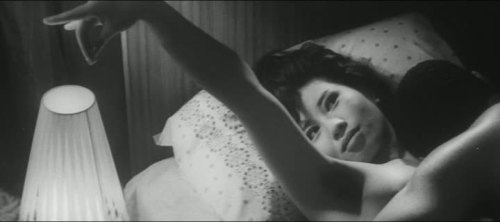by Allan Fish
(Japan 1965 88m) DVD2 (Japan only, no English subs)
Aka. Kuroi yuki
She was like a pack of marshmellows
d/w Tetsuji Takechi ph Takeo Kurata ed Hanzaburo Kaneko m Joji Yuasa
Kotobuki Hananomoto (Jiro), Yōichiro Mikawa, Chitose Kurenai, Yasuko Matsui, Takako Uchida, Mariko Taki, Akira Ishiyama, Chojiro Hanagawa, Chieko Murata,
The name of Tetsuji Takechi was always relegated to the margins and footnotes, even in traditional histories of Japanese cinema. When people come to remember the Japanese new wave of the late 1950s to early 1970s in decades to come, it’s rather to Yoshida, Teshigahara, Shindo, Suzuki, Masumura, Wakamatsu and Oshima that people will be directed first. The irony is Oshima would be the first to decry that summary expulsion to the periphery, for he was the biggest name in cinema to come forward to stand up for Takechi when Black Snow drew down censorial ire, and himself returned to film after a couple of years sabbatical. The reason for the legal action officially was its sexuality, but that was merely a smokescreen to prevent bringing up its anti-Americanism, too. It’s all too clear Takechi saw all those who lived off the American occupiers as parasites.
It was made at a time when the Japanese government were renegotiating a fresh Security treaty with the Johnson administration, and there was growing resentment and hostility to the continued American presence in Japan. Takechi’s film takes place at a focal point for the hostility, the Yokota airbase and the misleadingly named Yokota Hotel (which is actually a brothel for American servicemen). Among those living there is Jiro, who has grown up watching his mother service patrons. One of the girls has developed what looks to be syphilis, so his aunt brings another new girl to take the place of the invalid. While visiting the aunt lets slip that she’s looking after $20,000 for an American officer and Jiro decides he wants that money. He kills an American GI with a knife and then enlists two thugs to help him steal the cash, while being torn between two girls; the daughter of a taxi driver and the young girl brought to the brothel.
Black Snow is regarded as a crucial film in the pinku movement, yet it’s debatable whether it really is a pinku; there’s sex, yes, and most of the female cast take their clothes off, but it seems more akin to the violent youth movies – from The Sun’s Burial to Inferno of First Love and Diary of a Shinjuku Thief – which punctuated the Japanese new wave. Its rather dim hero is angry in the way only an outsider could be, and Takechi was certainly just that through his entire career. As Jasper Sharp wrote, Takechi was more a “dilettante and dabbler than driving force” and Black Snow was meant to give the finger to the movie establishment. The opening scene of a naked woman writhing and displaying a thicket of underarm hair was clearly a comment on the ludicrous taboo of not showing pubic hair in Japanese film. In a later scene he takes one of the girls to a movie theatre to watch a gung-ho American western and starts to let his hands stray to bring her to head-shaking orgasm, while later when in the process of raping his own aunt, he instead draws out the stolen service revolver and shoots her with it.
More disturbing to the western outsider is the incestuous element, and Takechi is ambiguous about it, suggesting that Jiro’s desire for his mother and aunt is not entirely unreciprocated, as much Jocasta Complex as Oedipus. Few of the cast would go on to make an impact in later work, and the same applied to Takechi. He’d be cleared by the establishment of all charges of obscenity, but not before his films had been black-marked in all forms of the media. By 1969 he’d effectively disappeared, and all attempts at a comeback were as futile as they were undistinguished. You expect Black Snow to be a bit of a relic, but it’s still filled with furious, righteous indignation, even though it’s likely that the surviving near 90 minute version released on Japanese DVD is not uncut from the Takechi original. There are cinematic connections, too, back to The Informer (the British in Ireland as opposed to the Americans in Japan), and to the senseless murder of A Short Film About Killing. Not easy to see with English subs, but if you get a chance, see it.























 Click on names for archives
Writers/Founders
Click on names for archives
Writers/Founders
I just watched this film this weekend! I was particularly taken by the seemingly omnipresent sound of US jets that interrupts and assaults the film’s narrative, really conveying the oppression and violence that Takechi associates with the American presence. It’s a harsh, but fascinating film. A great choice and fitting write-up.
I have secured my copy of this film from Allan and will be viewing it when back home. Marvellous review of course.